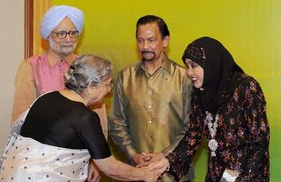 Brunei, Oct 10: Looking to strengthen the relationship with top countries of Asia-Pacific region, Prime Minister Manmohan Singh today discussed various economic issues and other areas of cooperation with his counterparts in Australia and Japan.
Brunei, Oct 10: Looking to strengthen the relationship with top countries of Asia-Pacific region, Prime Minister Manmohan Singh today discussed various economic issues and other areas of cooperation with his counterparts in Australia and Japan.
During his meeting with Australian Prime Minister Tony Abbott, Singh is believed to have discussed a wide range of issues, including sale of uranium to India, sources said.
Singh is believed to have discussed various issues, including economic cooperation, with Japanese Prime Minister Shinzo Abe.
The meetings were held on the sidelines of the ASEAN and East Asia Summits being held here. Singh had arrived here yesterday for these meetings and was scheduled to leave later this evening for Indonesia on a bilateral visit.
The EAS is a forum for cooperation among the ten ASEAN (Association of South East Asian Nations) nations and its partner countries — Australia, China, India, Japan, South Korea, New Zealand, Russia and the US.
The ten ASEAN nations comprise Brunei, Cambodia, Indonesia, Malaysia, Myanmar, Lao PDR, Philippines, Singapore, Thailand and Vietnam.
Speaking at the EAS, the Indian Prime Minister also called for greater cooperation among Asia-Pacific countries to tackle the global economic uncertainty.
Specific details of Singh’s meetings with Japanese and Australian Prime Ministers could not be immediately ascertained.
However, official sources had earlier said that the issue of uranium sale was expected to come up for discussion during Singh’s meeting with Australia’s newly elected Prime Minister, as the Abbott Government has been positive about stronger ties between the two countries on this issue.






Comments
Add new comment